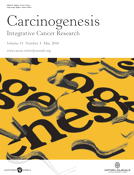Carcinogenesis (journal)
Academic journal From Wikipedia, the free encyclopedia
Carcinogenesis is a peer-reviewed medical journal in the field of cancer biology. It was established in 1980 and is published monthly by Oxford University Press. As of 2010[update], the editor-in-chief is Curtis C. Harris (National Cancer Institute).[1] Carcinogenesis publishes articles in four sections: cancer biology covers the cell and molecular biology of cancer, as well as mutation and DNA repair; molecular epidemiology includes genetic predisposition to cancer; cancer prevention covers chemoprophylaxis as well as dietary factors; and carcinogenesis covers all forms of carcinogens, including their metabolism and detection in the environment.[2] Authors can pay to have their articles released freely online as part of a hybrid open access scheme.[3] Free or reduced-rate online access is available to educational institutions in low-income countries.[4][5]
History
The journal was established in 1980 by R. Colin Garner (University of York) and Anthony Dipple (National Cancer Institute).[4][6] The original scope of Carcinogenesis was defined in the first issue as research relating to "the prevention of cancer in man", and the journal was conceived from the outset as a multidisciplinary journal, with the intention of encouraging the "cross-fertilization of ideas" across the "very broad spectrum of scientific endeavour" of cancer research.[7] In 2008, the journal added the subtitle "Integrative Cancer Research" to reflect its multidisciplinary scope.[8]
The journal was originally published by IRL Press,[6][9][10] which merged with Oxford University Press in 1989.[4][11]
Abstracting and indexing
Carcinogenesis is abstracted and indexed in Biological Abstracts, BIOSIS Previews, CAB Abstracts, Chemical Abstracts, Current Contents/Life Sciences, BIOBASE – Current Awareness in Biological Sciences, EMBASE, Excerpta Medica, Global Health, MEDLINE, ProQuest, and the Science Citation Index.[2] According to the Journal Citation Reports, the journal has a 2020 impact factor of 4.944.[12]
References
External links
Wikiwand - on
Seamless Wikipedia browsing. On steroids.

